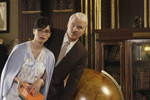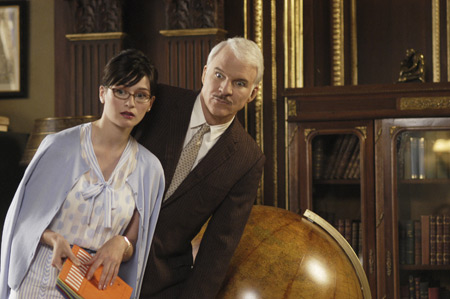The Pink Panther
 And yet another film in enters the category of “Remakes That Should Not Have Been.” It took three writers, Steve Martin, Michael Saltzman and Len Blum, to put together a bland remake of the relatively unfunny Blake Edwards 1963 original. Before I forget, there’s a second category this film falls into…
And yet another film in enters the category of “Remakes That Should Not Have Been.” It took three writers, Steve Martin, Michael Saltzman and Len Blum, to put together a bland remake of the relatively unfunny Blake Edwards 1963 original. Before I forget, there’s a second category this film falls into…

and Columbia Pictures’ The Pink Panther, a Columbia Pictures release.
Photo credit: Andrew Schwartz
And yet another film enters the category of “Prequels That Should Not Have Been.” It took three writers, Steve Martin, Michael Saltzman and Len Blum, to put together a bland precursor to the Blake Edwards 1963 original that featured Peter Sellers. Why Martin would ever want to attempt to re-interpret a persona made immortal by Sellers is beyond me. Before I forget, there’s a second category this film falls into, “Vehicle for Disposable Pop Star.” Yes, the instantly forgettable, heavily-processed junk food otherwise known as Beyoncé Knowles, a recording artist for Sony (the distributor of this film), has very little screen time except for the music video centerpiece to this bland and repetitious snoozefest.
Steve Martin plays Inspector Jacques Clouseau (Jacques Clouseau? Jacques Nastee? Nevermind.), who is recruited by Chief Inspector Dreyfus (Kevin Kline) to recover the Pink Panther, a rather large diamond, which was stolen from the famous soccer coach, Yves Gluant. He was murdered after his Team France defeated Team China. Gluant’s girlfriend, Xania (Knowles), is an immediate suspect, and acts like one.
What doesn’t make any sense at all is the primary motivation for the entire Clouseau plot. Chief Dreyfus recruits Clouseau because he wants the biggest foul-up of an officer in the French police to screw up the case, which he will then recover and win the Medal of Honor. Clouseau is given a nice office (instead of the usual crappy, delapidated office assigned to people as disliked by their superiors as he); a pretty secretary, Nicole (Emily Mortimer), with whom he unknowingly flirts (until he knowingly flirts) and a partner, Gendarme Gilbert Ponton (Jean Reno) whom Clouseau thinks he can school in the art of surprise.
“With me, surprises are rarely expected,” says Clouseau.
No kidding.
Why is Clouseau a necessary component in the Chief Inspector’s plan? Unless Dreyfus believes Clouseau can actually bring him closer to solving the case, wouldn’t he just investigate it himself? The movie never has an explanation for this, as it’s deemed sufficient enough by the writers and director to plummet into ninety minutes of sight gags beaten into your head with the regularity and deliberation of a sledgehammer duct taped to a metronome.
Consider the old-man-in-wheelchair gag. The entire sketch’s humor is supposed to rest on the fact that Clouseau rewires the poor guy’s battery on his wheelchair so that he goes backward instead of forward, and crashes into a fence. Hardy-har. I can understand why the six-year olds in the audience found this surprising and hilarious, but I’m a bit mystified by the adults who laughed at it and many of the other examples of equally-languid physical humor. We know that Clouseau is clumsy. We know that the film will be filled with crashes, crunches, thwacks, and the like. Is there something we don’t expect? Well, I wasn’t expecting to see Jean Reno dancing in a skin-tight bodysuit of wallpaper-colored camouflage, but this is after all the country that’s mesmerized by the comic stylings of Jerry Lewis.
There’s a scene in which Clouseau parallel-parks a tiny car. He rams the car ahead and another behind, repeatedly, and the camera cuts away to reveal he has at least two car-lengths of empty space in both directions. Ha ha. This scene goes on for what seems like minutes. Even if it were only forty seconds, it lasted about 39.5 seconds after it stopped being funny.
We know that Clouseau will succeed in his mission because: a) Audiences that go to films like this do not go to see Greek tragedy, they want to see a happy ending, and b) Clouseau being the underdog has to get his man as a way to stick it to the establishment, because that’s a plot device of irony too formulaic for writers this unclever to leave unused.
In her 1974 essay, “On The Future of Movies,” Pauline Kael wrote, “People in the audience want to laugh… They’re laughing at pandemonium and accepting it as the comic truth.” That’s all this film is, ninety minutes of pandemonium and no wit. What bothers me is that I know from the experience of “L.A. Story,” and, more recently, “Bowfinger,” that Steve Martin has it in him to seem harebrained while actually delivering the audience true wit — not unlike his successor in the mastery of absurdist humor, Stephen Chow. That’s what disappoints me about this movie. While those films work on several levels, this film barely functions at the ground floor.
Children may be transfixed by scene after scene of mindless visual shtick. I’m not going to suggest that a six-year old necessarily aspire to understand textured sociopolitical farce or even the double-entendres of those stealthily-bawdy 1940’s Warner Bros. cartoon shorts. But I have to be honest, watching this movie was a real chore for me. It will be for some parents, particularly those who don’t feel obliged to limit their child’s intellectual development by laughing along with every dumb joke just to humor them. The only reason I developed out of my juvenile tastes is because I was surrounded by people who didn’t dumb themselves down for me. I’m not suggesting you reprimand your children for being entertained by this dreck. No… I’m just saying that when your child wonders why you’re not laughing, tell them.
Children aren’t so different from adults as you may think. Both will settle for the least common denominator in entertainment, but each in their own way yearns to learn something new. Do yourself and your children’s developing sense of humor a favor, and see something that makes you laugh without insulting your capacity for thought.
 The Pink Panther • Dolby® Digital surround sound in select theatres • Aspect Ratio: 1.85:1 • Running Time: 93 minutes • MPAA Rating: PG for occasional crude and suggestive humor and language. • Distributed by Columbia Pictures
The Pink Panther • Dolby® Digital surround sound in select theatres • Aspect Ratio: 1.85:1 • Running Time: 93 minutes • MPAA Rating: PG for occasional crude and suggestive humor and language. • Distributed by Columbia Pictures
Â
Â